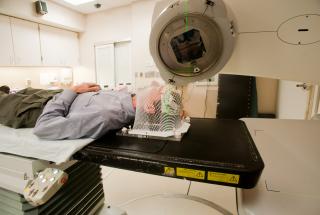The announcement that the UK will take the lead in research into radiotherapy will create a 'global hub', according to Cancer Research UK (CR-UK).
Seven centres will form a £56million research network and pioneer the use of techniques such as FLASH radiotherapy, as well as artificial intelligence.
Cancer Research UK RadNet will unite the Universities of Cambridge, Glasgow, Leeds, Manchester and Oxford, the CR-UK City of London Centre (a partnership between UCL, Queen Mary University of London, King’s College London the Francis Crick Institute) and The Institute of Cancer Research in partnership with The Royal Marsden NHS Foundation Trust.
New research groups and PhD students in Manchester, London and Cambridge will be funded with £13m. The network will promote collaboration between diverse scientific fields, with a share of £4 million available to all centres for joint research projects, conferences and secondments between locations.
Research projects will include:
- FLASH radiotherapy, where pulses of high-dose of radiation are delivered in a fraction of a second. Research suggests that FLASH has the potential to cause less damage to healthy tissue.
- Further investigation into proton beam therapy.
- Overcoming hypoxia - low oxygen levels within tumours. Scientists will develop better ways to identify hypoxic tumours and new treatments to oxygenate them, making radiotherapy more powerful.
- Looking at why some cancers come back after radiotherapy by studying the role of cancer stem cells. These are resistant to radiation and just a few stem cells remaining after treatment can cause a patient’s cancer to return.
- Developing and testing drugs to be used in combination with radiotherapy. This will include immunotherapies and research into how tumours are able to repair DNA damage caused by radiotherapy, using the latest gene-editing technology to develop drugs that interfere with the process.
- Using artificial intelligence to designing personalised treatment plans guided by data from patients’ scans.
“Radiotherapy is a cornerstone of cancer medicine, with around three in 10 patients receiving it as part of their primary treatment. The launch of our network marks a new era of radiotherapy research in the UK," Michelle Mitchell, chief executive of CR-UK said.
"Scientists will combine advances in our understanding of cancer biology with cutting-edge technology to make this treatment more precise and effective than ever before”
